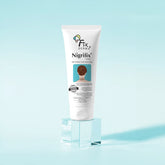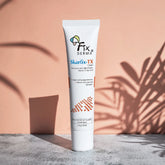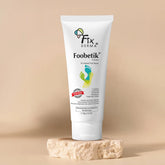
Debunking The Myths!
Myth 1: Vitiligo is Contagious
Fact:Vitiligo is not contagious. It is an autoimmune condition where the immune system mistakenly attacks the melanocytes (pigment-producing cells) in the skin, leading to loss of color. It cannot be spread from person to person through contact.
Myth 2: Vitiligo Only Affects People with Darker Skin
Fact: Vitiligo can affect individuals of all skin tones. While it may be more noticeable on darker skin, people of any ethnicity or skin color can develop the condition.
Myth 3: Vitiligo is a Skin Disease
Fact: Vitiligo is not a disease; it is a skin disorder. It involves the loss of pigmentation but does not harm the skin or affect its overall health. People with vitiligo can lead healthy lives.
Myth 4: Vitiligo is Caused by Poor Hygiene
Fact: There is no link between hygiene and the development of vitiligo. The condition is primarily related to genetic, environmental, and autoimmune factors.

Tips From An Expert’s Desk!
Hydration is the Key:
Drink plenty of water daily to keep your skin hydrated from the inside out. Aim for at least 8-10 glasses of water.
Moisturize Regularly:
Use a suitable moisturizer for your skin type. Apply it immediately after cleansing to lock in moisture.
Sunscreen is Non-Negotiable:
Always wear sunscreen with at least SPF 30, even on cloudy days. Reapply every two hours if you're outdoors.
Gentle Cleansing:
Use a gentle, sulfate-free cleanser to avoid stripping the skin of its natural oils. Cleanse twice daily.
FAQs
1- What is Vitiligo, and how does it affect the skin?
Vitiligo is a skin condition characterized by the loss of skin color in patches due to the destruction of melanocytes, the cells responsible for melanin production. This can result in uneven skin tone and affect self-esteem.
2- How does Vitipause Gel help with Vitiligo?
Vitipause Gel is rich in antioxidants and supports melanin regulation, which can help improve the appearance of vitiligo. Its non-greasy formula absorbs quickly and nourishes the skin without leaving a residue.
3- What are the key ingredients in Vitipause Gel?
Vitipause Gel contains a blend of powerful ingredients, including Melitane GL, Madecassoside, Greyverse, and Cucumis Melo Extract, which work together to support skin health and improve vitiligo.
4- Is Vitipause Gel suitable for all skin types?
Yes, Vitipause Gel is formulated to be suitable for all skin types, including sensitive skin. Its non-greasy and lightweight texture makes it ideal for daily use.
5- How often should I apply Vitipause Gel for best results?
For optimal results, it is recommended to apply Vitipause Gel twice daily, preferably in the morning and evening. Consistency is key in achieving visible improvements.
6- Can I use Vitipause Gel alongside other skincare products?
Yes, Vitipause Gel can be integrated into your existing skincare routine. However, it is advisable to allow it to absorb fully before applying any additional products to ensure maximum efficacy.
7- Are there any side effects associated with using Vitipause Gel?
Vitipause Gel is formulated with gentle, skin-friendly ingredients, making it suitable for most users. However, if you experience any irritation or adverse reactions, discontinue use and consult a dermatologist.
8- How long will it take to see results from using Vitipause Gel?
Individual results may vary, but many users report visible improvements in skin tone and texture within a few weeks of consistent use. Patience and regular application are essential for best results.
9- Is Vitipause Gel safe for pregnant or breastfeeding women?
While Vitipause Gel contains natural ingredients, it is always best to consult with a healthcare professional before using any skincare product during pregnancy or while breastfeeding.
10- Where can I purchase Vitipause Gel and other products for Vitiligo?
You can purchase Vitipause Gel and explore our complete range of vitiligo care products on the
Fixderma Vitiligo Collection page. Enjoy the benefits of targeted care for vitiligo and promote healthier-looking skin!














